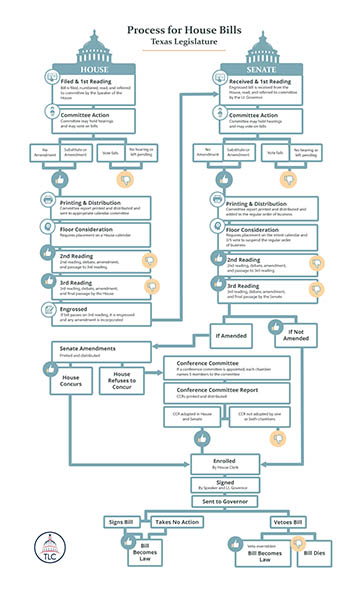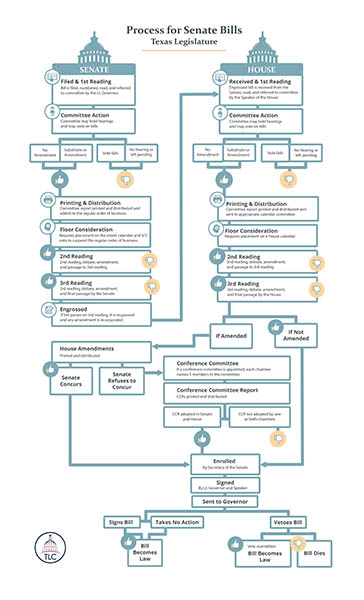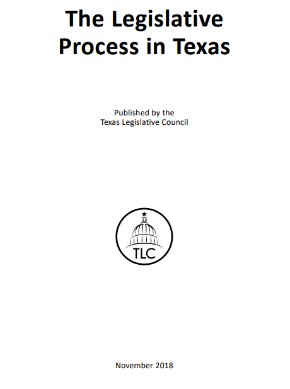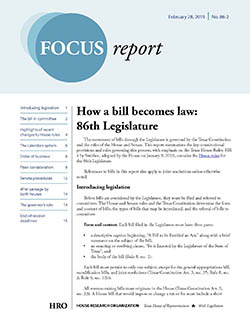- Texas Redistricting, Texas Legislative Council
In this weekly post, we feature helpful research tools and recent articles of interest to the legislative community.
- Find out what heavy metals and "forever" chemicals might be in bottled water, by brand. (Consumer Reports, September 24, 2020)
- Review a report card of governors' fiscal policies. (Cato Institute, October 5, 2020)
- Explore a new online collection of ratified Indian Treaties from the National Archives. (National Archives and Records Administration, October 13, 2020)
- Read about why the U.S. Supreme Court has nine justices. (History.com, September 24, 2020)
Librarians review and select articles from more than 1,000 print and online sources to compile a weekly annotated list of Current Articles of interest to the legislative community. View this week's Current Articles.
How a Bill Becomes a Law
Oct 14
The Texas Constitution and the Rules of the House and Senate set the procedure that a bill must follow in order to be passed into law. Here are the basic steps in the legislative process:
- Bill filing/introduction
- First reading and referral to committee
- Committee consideration
- Floor consideration on second and third reading
- Engrossment
- Consideration in opposite chamber
- Concurrence in opposite chamber's amendments, or conference committee report
- Sent to Governor
- Governor signs bill or takes no action
- Bill becomes law on effective date
Bills that do not pass or are vetoed by the Governor must be reintroduced the next session; the bill number does not carry over.
Several key publications describing the Texas legislative process are available on the Legislative Reference Library website under General Information | Texas legislative agencies & process, including:
Bill process flowcharts for the House and Senate. Online versions are available through the Texas Legislative Council.
The Legislative Process in Texas, by the Texas Legislative Council (November 2018), details each step in the legislative process, from how a bill originates to the filing and publication of laws.
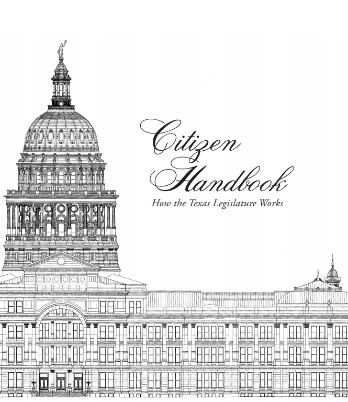
Citizen Handbook: How the Texas Legislature Works, published by the Secretary of the Senate (February 2019), includes a short history of the Texas Capitol, an overview of the Texas Senate and Texas House of Representatives, legislative advocacy tips, and basic steps in the legislative process.
The Legislative Lexicon, by the Senate Research Center (January 2019), explains the vocabulary of the legislature from A-Z, such as the difference between an engrossed and enrolled bill.
How a Bill Becomes Law: 86th Legislature, by the House Research Organization (February 28, 2019), provides an overview of the legislative process with a focus on House rules.
- House Select Committee on Mass Violence Prevention & Community Safety
- House Committee on Public Health
- Interim Hearings – Week of March 9, 2020 (Blog), March 11 – House Select Committee on Mass Violence Prevention & Community Safety, Legislative Reference Library, March 4, 2020
- Interim Hearings – Week of January 6, 2020 (Blog), January 9 – House Select Committee on Mass Violence Prevention & Community Safety, Legislative Reference Library, December 31, 2019
- Interim Hearings – Week of December 2, 2019 (Blog), December 4 – Senate Select Committee on Mass Violence Prevention & Community Safety, Legislative Reference Library, November 26, 2019
- Interim Hearings – Week of November 4, 2019 (Blog), November 7 – House Select Committee on Mass Violence Prevention & Community Safety, Legislative Reference Library, October 30, 2019
- Interim Hearings – Week of October 7, 2019 (Blog), October 10 – House Select Committee on Mass Violence Prevention & Community Safety, Legislative Reference Library, October 2, 2019
- Texas Safety Action Report, Governor Greg Abbott, September 12, 2019
- Executive Order GA-07, Relating to the Prevention of Mass Attacks, Governor Greg Abbott, September 5, 2019
- House Committee Resources: Mass Violence Prevention & Community Safety (Blog), Duty (1), Legislative Reference Library, August 21, 2020
- Gun Control: DOJ Can Further Improve Guidance on Federal Firearm Background Check Records, United States Government Accountability Office, July 2020
- "Ensuring Only 'Good Guys' Can Get Guns: How Implementation of a Federal Background Check Requirement on All Firearm Transfers Can Impact Gun Violence," 44 Seton Hall Legislative Journal 559 (2019)
- Gun Control: DOJ Can Further Improve Guidance on Federal Firearm Background Check Records, United States Government Accountability Office, July 2020
- The Attorney General's Semiannual Report on the Fix NICS Act (Fix NICS Act of 2018), U.S. Department of Justice, November 2019
- National Instant Criminal Background Check System (Reports & Statistics, Regulations, Statutes), Federal Bureau of Investigation
- Mass Attacks in Public Spaces - 2019, United States Secret Service, National Threat Assessment Center, August 2020
- Ron Barnes, Head of State Legislative Affairs, Google
- Committee Resources: House Select Committee on Mass Violence Prevention & Community Safety (Blog), Duty (4), Legislative Reference Library, August 10, 2020
- Mass Attacks in Public Spaces - 2019, United States Secret Service, National Threat Assessment Center, August 2020
- K-12 Education: Characteristics of School Shootings, United States Government Accountability Office, June 2020
- HB 253, which requires the Health and Human Services Commission (HHSC) to develop and implement a five-year strategic plan to address postpartum depression. Monitor the development of the strategic plan to ensure it provides strategies to improve access to postpartum depression screening, referral, treatment, and support services.
- Postpartum Depression Strategic Plan, As Required by House Bill 253, 86th Legislature, Regular Session, 2019, Texas Health and Human Services Commission, September 2020
- SB 436, which requires the Department of State Health Services (DSHS), in conjunction with the Maternal Mortality and Morbidity Task Force, to develop and implement statewide initiatives to improve maternal and newborn health for women with opioid use disorder. Examine the process by which DSHS and the Task Force develop and implement the initiatives, and, if applicable, monitor the development of the optional pilot program authorized by the legislation.
- SB 748, which creates a newborn screening preservation account and requires the development of a program to provide prenatal and postpartum care through telehealth or telemedicine in certain counties, a high risk maternal care coordination services pilot program, and a pregnancy medical home pilot program. Monitor the rulemaking process at HHSC and conduct oversight of the creation of the newborn screening preservation account and the maternal health programs. Identify any challenges that arise in funding the account or implementing the programs. Ensure the required agencies are providing adequate data collection on maternal mortality rates, maternity care, and postpartum depression in the state.
- "New Test Added to Robust Newborn Screening Program," Texas Health and Human Services Commission, October 4, 2019
- SB 749, which relates to designating levels of neonatal and maternal care for hospitals and establishes an appeal process, waiver agreement, and telemedicine exceptions. Monitor HHSC's rulemaking process.
- SB 750, which directs HHSC to evaluate and develop a limited postpartum care package for new mothers enrolled in the Healthy Texas Women (HTW) program and to develop strategies to ensure continuity of care for new mothers who transition from Medicaid for Pregnant Women into HTW. Monitor HHSC's rulemaking process and the evaluation and development of the postpartum care package in HTW.
- "HHSC's Healthy Texas Women Program Launches Enhanced Postpartum Care Services," Texas Health and Human Services Commission, August 31, 2020
- SB 2132, which requires additional information to be provided to new mothers enrolled in HTW. Monitor HHSC's rulemaking process.
- HB 2174, which establishes limits on prescribing opioids for acute pain and institutes certain requirements for controlled substance prescription submissions and continuing education for prescribers.
- HB 3284, which revises the circumstances under which the Texas State Board of Pharmacy (TSBP) may allow access to information relating to controlled substances prescriptions. Monitor the collaboration between TSBP and the State Board of Veterinary Medical Examiners in implementing the legislation.
- 22 Texas Administrative Code § 315.15, Access Requirements, and 22 Texas Administrative Code § 315.16, Patient Access to Prescription Monitoring Program Prescription Record, Texas State Board of Pharmacy
- Texas Prescription Monitoring Program, Texas State Board of Pharmacy
- HB 3285, which creates programs and initiatives to prevent and respond to opioid addiction, misuse, abuse, and overdose and identify and treat co-occurring substance use disorders and mental illness. Monitor the process by which the Governor's Criminal Justice Division will award grants to law enforcement agencies for opioid antagonists. Conduct oversight of the process related to Medicaid reimbursement for medication-assisted treatment. Examine the impact of the opioid crisis on Texas' seniors, and review any programs and services available to prevent and treat opioid misuse among that population.
- Addressing Substance Use in Texas: Public Health Agency Action Plan: 2020 - 2022, Texas Department of State Health Services, January 2020
- HHSC Rider 34, which requires HHSC to evaluate opioid drug prescribing practices under Medicaid and assess the extent to which they align with the Center for Disease Control and Prevention guidelines.
- Evaluation of Opioid Drug Prescribing Practices Under Medicaid, As Required by House Bill 1, 86th Legislature, Regular Session, 2019 (Article II, Health and Human Services Commission, Rider 34), Texas Health and Human Services Commission, September 2020
- CDC Guideline for Prescribing Opioids for Chronic Pain, Centers for Disease Control and Prevention, last updated August 28, 2019
- HB 3934, which provides rural hospitals with the authority to establish a health care collaborative.
- SB 170, which relates to the reimbursement of rural hospitals under Medicaid. Monitor the reimbursement methodology developed by HHSC.
- SB 633, which provides the authority to assemble local mental health authorities (LMHA) in rural areas into groups in order to ensure access to mental health services in those areas. Conduct oversight of the process of grouping individual LMHAs and the development of a plan for each group to increase capacity and access.
- SB 1621, which creates a rural hospital strategic plan.
- HB 871, which authorizes certain rural hospitals to satisfy trauma facility designation requirements through the use of telemedicine. Monitor HHSC's rulemaking process.
- 25 Texas Administrative Code § 157.33, Certification; 25 Texas Administrative Code § 157.34, Recertification; and 25 Texas Administrative Code § 157.125, Requirements for Trauma Facility Designation, Texas Health and Human Services Commission
- HB 1501, which creates the Texas Behavioral Health Executive Council. Monitor the transfer of the regulation of psychologists, marriage and family therapists, professional counselors, and social workers to the new council.
- HB 1504, which continues the Texas Medical Board until September 1, 2031. Review and identify any challenges related to the processing of complaints, including due process concerns and the independence of the Board. Make recommendations for additional modifications to address these challenges.
- Texas Medical Board (Sunset Review Documents for 2018-2019 Review Cycle, 86th Legislative Session). Texas Sunset Advisory Commission
- HB 3148, which establishes provisions related to the administration and oversight of investigational adult stem cell treatments. Monitor the creation of the investigational stem cell registry.
- Proposed Rules, 25 Texas Administrative Code § 1.462, Informed Consent for Investigational Stem Cell Treatment, Texas Department of State Health Services / Texas Secretary of State, Texas Register, September 11, 2020
- HB 3703, which expands eligibility for low-THC cannabis prescriptions. Monitor HHSC's rulemaking process.
- 25 Texas Administrative Code § 1.61, Incurable Neurodegenerative Diseases, Texas Department of State Health Services
- HB 4455, which authorizes a health professional to provide a mental health service via telemedicine or telehealth services to a patient located outside of Texas.
- SB 21, which raises the age to purchase tobacco from 18 to 21.
- Tobacco Prevention and Control Program, Texas Department of State Health Services
- SB 670, which relates to ensuring reimbursement of telemedicine and telehealth services and expanding which facilities may receive reimbursement for those services.
- HB 18, which enhances school safety and mental health resources for students and school personnel and works to reduce the stigma around mental health conditions. Monitor the process by which state agencies coordinate to implement the legislation and their compliance with various requirements, including providing required guidelines and resources to schools.
- HB 19, which places non-physician mental health professionals at education service centers to provide resources for educators and administrators in school districts and charter schools.
- HB 906, which creates the Collaborative Task Force on Public School Mental Health Services.
- SB 11, which creates the Texas Child Mental Health Care Consortium to facilitate access to mental health care services through telehealth and expands the mental health workforce through training and funding opportunities. Monitor the creation of the consortium and agencies' rulemaking processes. Review how school districts are spending their school safety allotment.
- "HHSC Continues Efforts to Address the Opioid Crisis" (News Release), Texas Health and Human Services Commission, September 24, 2020
- "Governor Abbott, Lieutenant Governor Patrick, Attorney General Paxton Issue Statement On Withdrawal of Medicaid Fiscal Accountability Regulation" (Press Release), Office of the Texas Governor, September 14, 2020
- House Committee Resources: Human Services (Blog — Charge 2.2 - 2.5, Charge 2.1), Legislative Reference Library, September 4, 2020
- Medicaid Expansion's Impact in Texas (Policy Brief), Mosbacher Institute for Trade, Economics, and Public Policy, Texas A&M University, September 2020
- Texas Healthcare Transformation and Quality Improvement Program, Center for Medicaid and CHIP Services, Centers for Medicare & Medicaid Services
- Report on Suicide and Suicide Prevention in Texas, As Required by House Bill 3980, 86th Legislature, Regular Session, 2019, Texas Health and Human Services Commission, May 2020
- Texas Statewide Behavioral Health Strategic Plan: Progress Report, Statewide Behavioral Health Coordinating Council, December 2019
- Coordinated Statewide Behavioral Health Expenditure Proposal: Fiscal Year 2020, As Required by the 2020-21 General Appropriations Act, H.B. 1, 86th Legislature, Regular Session, 2019 (Article IX, Section 10.04), Statewide Behavioral Health Coordinating Council, September 2019
- Texas Statewide Behavioral Health Fiscal Years 2017-2021: Strategic Plan Update and the Foundation for the IDD Strategic Plan, As Required by the 2016-17 General Appropriations Act, H.B. 1, 84th Legislature, Regular Session, 2015 (Article IX, Section 10.04), Statewide Behavioral Health Coordinating Council, February 2019
- Texas Mental Health Resource Guide: A Book for Mental Health & Substance Use Disorder Resources Across the State of Texas, Texas Court of Criminal Appeals, 2019
- Texas 86th Legislative Session: Summary of Mental Health and Substance Use-Related Legislation, Hogg Foundation for Mental Health, The University of Texas at Austin, September 3, 2019
- Intellectual and Developmental Disabilities, Suicide, Texas Statewide Behavioral Health Coordinating Council
In this weekly post, we feature helpful research tools and recent articles of interest to the legislative community.
- Read about the current recession's impact on American workers. (Economic Policy Institute, September 25, 2020)
- Review the ways COVID-19 spreads. (Centers for Disesase Control and Prevention, updated October 5, 2020)
- Consider how the totality of the circumstances in police shootings affect the outcomes. (Human Events, accessed September 25, 2020)
- Read about U.S. Supreme Court nominee Judge Amy Coney Barrett's past jurisprudence. (Congressional Research Service, October 6, 2020)
Librarians review and select articles from more than 1,000 print and online sources to compile a weekly annotated list of Current Articles of interest to the legislative community. View this week's Current Articles.
- "To Better Serve Adult Learners, Eliminate the Barriers Between Work and Learning," EdSurge, January 30, 2020
- Interim Report to the 85th Legislature (Charge 6 – Non-traditional students), House Committee on Higher Education, January 2017
- Adult Learners and Non-Traditional Students (Presentation by Commissioner Raymund A. Paredes to House Committee on Higher Education), Texas Higher Education Coordinating Board, June 21, 2016
- Interim Report (Charge 5 – Non-traditional students), Senate Committee on Higher Education, December 2012
- 2020 Texas Public Higher Education Almanac, Texas Higher Education Coordinating Board, Summer 2020
- Postsecondary Data GPS: A Guidebook for Navigating Data to Promote Student Success, Institute for Higher Education Policy, February 2020
- Texas Higher Education Data, Texas Higher Education Coordinating Board
- Senate Bill 25, relating to measures to facilitate the transfer, academic progress, and timely graduation of students in higher education.
- Emergency Rules, 19 Texas Administrative Code §§ 4.83-4.85, Dual Credit Partnerships Between Secondary Schools and Texas Public Colleges, Texas Higher Education Coordinating Board / Texas Secretary of State, Texas Register, August 9, 2019
- Negotiated Rulemaking, Texas Higher Education Coordinating Board
- Teaching in the Time of COVID-19: State Recommendations for Educator Preparation Programs and New Teachers, State Policy Map Tracker, American Association of Colleges for Teacher Education, September 22, 2020
- Teaching & Learning in the Time of COVID-19 – Research Brief: Early Challenges and Solutions from Teachers (Distance Learning Research Brief #1), Urban Education Institute, The University of Texas at San Antonio, July 20, 2020
- COVID-19 Update: State Policy Responses and Other Executive Actions to the Coronavirus in Public Schools (Teachers, Virtual/Hybrid Learning), Education Commission of the States, May 20, 2020
- 50-State Comparison: Teacher Recruitment and Retention, Individual State Profile – Texas, Education Commission of the States, October 23, 2019
- Report to the 85th Legislature (Charge 8 – Teacher shortage and retention, Joint Charge with Senate Committee on Higher Education), Senate Committee on Education, November 2016
- Educator Reports and Data (Teacher Attrition and Retention), Texas Education Agency
- Prosperity Requires Being Bold: A Progress Report (Report to the Office of the Governor), Texas Education Agency, Texas Higher Education Coordinating Board, and Texas Workforce Commission, February 2020
- Understanding the Need for Adult Education in Texas, Texas Workforce Investment Council, December 2018
- State Fiscal Year 2018 Adult Education and Literacy Outcome Report to the Texas Legislature, Texas Workforce Commission
- Strategic Plan for Adult Education and Literacy FY 2018 Progress Report, Texas Workforce Commission
- The Texas GED Problem Is Getting Worse: Not Enough Texans Are Earning Their High School Equivalency, Center for Public Policy Priorities, January 2018
- Texas Adult Education and Literacy Guide, Texas Workforce Commission, July 2017
- Strategic Plan for Adult Education and Literacy for the Fiscal Year of 2015 – 2020, Texas Workforce Commission
- Interim Report (Charge 2 – Technology, includes online courses), Senate Committee on Higher Education, December 2014
- Interim Report to the 83rd Texas Legislature (Charge 4 – Adult Basic Education, Joint Charge with House Committee on Appropriations), House Committee on Higher Education, January 2013
- Adult Education, Texas Workforce Commission
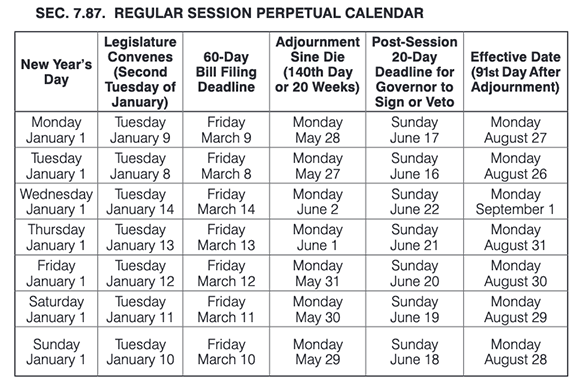
In this weekly post, we feature helpful research tools and recent articles of interest to the legislative community.
- Explore how the electoral college process will progress for the 2020 presidential election. (Congressional Research Service, September 3, 2020)
- Read about older women's retirement security. (U.S. Governmental Accountability Office, September 24, 2020)
- Check park status before visiting one of Texas' state parks. (Texas Parks and Wildlife Department, accessed September 30, 2020)
- Learn about the Coronavirus Food Assistance Program 2 for agricultural producers. (U.S. Department of Agriculture, September 17, 2020)
Librarians review and select articles from more than 1,000 print and online sources to compile a weekly annotated list of Current Articles of interest to the legislative community. View this week's Current Articles.
- Office of the Governor
- General Proclamation (Ordering a general election on November 3, 2020), August 26, 2020
- General Proclamation (Related to early voting by personal appearance and delivery of a marked mail ballot), June 27, 2020
- Texas Secretary of State
- Am I Registered?
- Application for a Ballot by Mail
- COVID-19 Resources for Election Officials (Election Law Advisories, Voting and Election Health Protocols)
- Elections Division
- VoteTexas.gov — Register to Vote
- VoteTexas.gov — WHEN (Early Voting, Helpful Hints on Voting Early by Mail)
- Preparing Your State for an Election Under Pandemic Conditions, Brennan Center for Justice, last updated September 25, 2020
- Voting Outside the Polling Place: Absentee, All-Mail and Other Voting at Home Options, National Conference of State Legislatures, September 21, 2020
- Voting by Mail in a Pandemic: A State-by-State Scorecard, Brookings Institution, September 2020
- How Does Vote-by-Mail Work and Does It Increase Election Fraud?, Brookings Institution, June 22, 2020
- COVID-19: Remote Voting Trends and the Election Infrastructure Subsector, Congressional Research Center, June 10, 2020
- Accessing the Vote During a Pandemic, Bipartisan Policy Center, May 2020
- The Neutral Partisan Effects of Vote-by-Mail: Evidence from County-Level Rollouts, Stanford Institute for Economic Policy Research, Stanford University, April 2020
- How to Protect the 2020 Vote from the Coronavirus, Brennan Center for Justice, March 16, 2020
- "Left in the Dust: Texas Hill Country Transforming From Once-Pristine Cattle Ranches Into Industrial Zones," KVUE.com, updated September 29, 2019
- "A World Rocked," "A Community Battle," "A Reluctance to Act" (Three-Part Series), Austin American-Statesman, September 2019
- Texas Misusing 17-Year Old Air Pollution Model to Permit Inner-City Joppa Asphalt Plant, Downwinders at Risk, August 20, 2019
- Guide to Air Quality Permitting for Concrete Batch Plants, Environmental Clinic, The University of Texas at Austin School of Law, Fall 2018
- The Texas Aggregate Industry is Crushing Hill Country Dreams, Public Citizen, July 23, 2018
- "Opposition Solidifies Against Houston's Concrete Batch Plants," Houston Chronicle, February 11, 2017
- Dirt, Sand, and Rock Quarries and Aggregate Processing Plants: Compliance Resources, Texas Commission on Environmental Quality
- Quarry and Pit Program, Texas Department of Transportation

